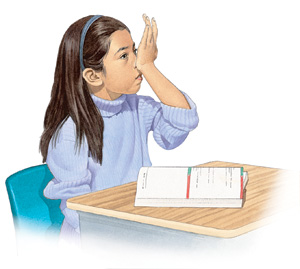When Your Child Has Nasal Allergies (Allergic Rhinitis)
Rhinitis is a reaction that occurs in the nose when airborne irritants (allergens) trigger the body to release histamine. Histamine causes itching, inflammation, and fluid or mucus production in the fragile linings of nasal passages, sinuses, and eyelids. There is usually a family history of allergic rhinitis.
Children with allergic rhinitis (also called nasal allergies) are sensitive to one or more substances in the air. Some children have allergies that come and go with the seasons (“hay fever”). Others may have allergies all year long. Nasal allergies can cause your child to lose sleep, feel tired, and have trouble paying attention in school. But you and your child’s doctor can develop a plan to help keep your child’s allergies under control.
 |
| A child with nasal allergies often rubs her nose in a gesture called the “allergic salute.” This is when a child rubs his or her hand upward across the bridge of the nose while sniffing. IT may cause a line or crease to form across the bridge of the nose. |
What are the Types of Allergic Rhinitis
The two categories of allergic rhinitis include:
What Causes Nasal Allergies?
Nasal allergies are often caused by one or more of the following:
-
Dust mites (tiny insects that live in carpets, bedding, stuffed toys, and other fabric items)
-
Pollen from grasses, trees, and weeds
-
Cockroaches
-
Furry or feathered pets
-
Mold
-
Animal dander
-
Tobacco smoke
What Are the Symptoms of Nasal Allergies?
Symptoms of nasal allergies can be mild or severe and include:
-
Sneezing
-
Runny (clear drainage) or stuffy nose
-
Itchy, watery, red, or swollen eyes
-
Itchy nose, throat, and ears
-
Nosebleeds
-
Cough from mucus dripping down the back of the throat (postnasal drip)
-
Sore throat
-
Dark circles under the eyes
-
Facial pressure or pain
-
Frequent ear or sinus infections
-
Snoring
-
Poor performance in school
The symptoms of allergic rhinitis may resemble other conditions or medical problems. Always see your child's health care provider for a diagnosis.
How Are Nasal Allergies Diagnosed?
A health history and physical exam are usually all your child’s doctor needs to diagnose nasal allergies. Your child may be referred to an allergist (doctor who specializes in allergies). An allergist is a specialist who is trained to perform allergy skin testing which will tell you exactly what environmental aeroallergens cause allergic symptoms in your child. Skin or blood tests help identify which allergens your child is most sensitive to. This helps you and your child’s healthcare provider make a treatment plan.
How Are Nasal Allergies Treated?
Specific treatment for allergic rhinitis will be determined by your child's health care provider based on:
-
Your child's age, overall health, and medical history
-
Extent of the reaction
-
Your child's tolerance for specific medications, procedures, or therapies
-
Expectations for the course of the reaction
-
Your opinion or preference
Limiting your child’s exposure to allergens is a vital part of treatment. Discuss with your child's health care provider the best way to limit your child’s contact with things that trigger his or her allergies. The health care provider may also suggest one or more medications, including:
-
Antihistamines. These relieve itching, sneezing, and a runny nose. Antihistamines can be used on their own or along with steroid nasal sprays. You can buy some antihistamines over the counter. Others are available by prescription. Certain antihistamines can make your child drowsy. Ask the healthcare provider which type is best for your child.
-
Steroid nasal sprays. These help reduce swelling and relieve itching and sneezing. They aren’t the same as the decongestant nasal sprays you buy in the store. Steroid nasal sprays are usually used every day to prevent symptoms.
-
Other medications. Healthcare providers sometimes prescribe other medications, such as leukotriene inhibitors, cromolyn sodium, or allergy eyedrops. If one of these is right for your child, your doctor will tell you more.
-
Allergy shots (immunotherapy). Allergy shots contain tiny amounts of the substances your child is allergic to, such as pollen or dust mites. The shots may make your child less sensitive to these allergens. Allergy shots are given in your healthcare provider’s office. They won’t work unless your child receives them regularly, often for a period of years.
Irritants Make Allergies Worse
Irritants don’t cause nasal allergies, but they can make symptoms worse. Common irritants include:
Call your child's health care provider if he or she has any of the following:
|